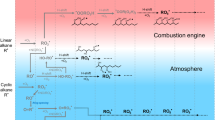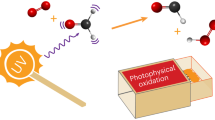Abstract
PROF. BONE has quoted in his letters with regard to the mechanism of combustion several interesting experimental results which he considers confirm the hydroxylation theory. He has recently directed attention to the finding by Dr. D. M. Newitt and Mr. A. E. Haffner of methyl alcohol in the oxidation products of methane and states that this has “shown conclusively that the slow oxidation of methane proceeds throughout in accordance with the hydroxylation theory”.1
This is a preview of subscription content, access via your institution
Access options
Subscribe to this journal
Receive 51 print issues and online access
$199.00 per year
only $3.90 per issue
Buy this article
- Purchase on Springer Link
- Instant access to full article PDF
Prices may be subject to local taxes which are calculated during checkout
Similar content being viewed by others
References
NATURE, 127, p. 481, Mar. 28, 1931.
Engineering, Feb. 4, 1927.
Ber., 62, 2460; 1929.
Rieche, Ber., 61, 951; 1928.
Author information
Authors and Affiliations
Rights and permissions
About this article
Cite this article
MARDLES, E. The Peroxidation of Hydrocarbons during Combustion in Air. Nature 128, 116–117 (1931). https://doi.org/10.1038/128116b0
Issue Date:
DOI: https://doi.org/10.1038/128116b0
Comments
By submitting a comment you agree to abide by our Terms and Community Guidelines. If you find something abusive or that does not comply with our terms or guidelines please flag it as inappropriate.



